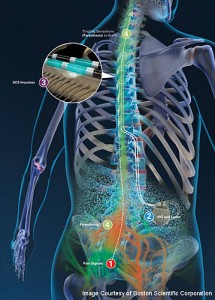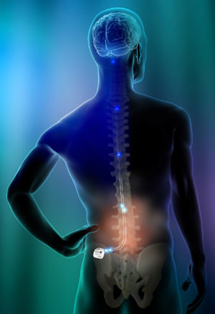 A spinal cord stimulator (SCS) is a device that utilizes pulsed electrical signals to the spinal cord in order to control chronic pain. Spinal cord stimulation consists of stimulating electrodes, an electrical pulse generator, conducting wires connecting the electrodes to the generator, and a generator remote control. SCS has notable pain relieving properties and can be used to treat pain from failed back surgery syndrome, refractory pain due to ischemia, or complex regional pain syndrome.
A spinal cord stimulator (SCS) is a device that utilizes pulsed electrical signals to the spinal cord in order to control chronic pain. Spinal cord stimulation consists of stimulating electrodes, an electrical pulse generator, conducting wires connecting the electrodes to the generator, and a generator remote control. SCS has notable pain relieving properties and can be used to treat pain from failed back surgery syndrome, refractory pain due to ischemia, or complex regional pain syndrome.

Following a psychiatric evaluation, a trial period of stimulation over a period of 5–7 days is used to ensure the SCS will be effective. This is important because of the cost of the equipment coupled with the aggressive nature of the procedure. These trial periods are deemed successful if the patient achieves more than a 50% reduction in their pain.
To be considered for neurostimulation implants, a patient must meet all of the following criteria:
- A diagnosis responsive to the therapy
- The patient has failed in traditional therapy
- Significant psychological issues are not at issue
- A trial has demonstrated pain relief
SCS is pain relief on demand, and it can be a suitable option when other forms of therapy have failed. It is effective in about 50–70% cases, but because it is an invasive procedure, it can have associated complications such as infection, bleeding, or dural puncture. It also has the risk of disconnection or equipment failure. Additional risks include unexpected changes in stimulation which can lead to failure of the device. Serious patient injury or death can occur when the SCS interacts with MRI, ultrasound, pacemakers, or diathermy.
If you would like to learn more about treatment with spinal cord stimulators, call the Spine Institute Northwest at 888-712-0318.

